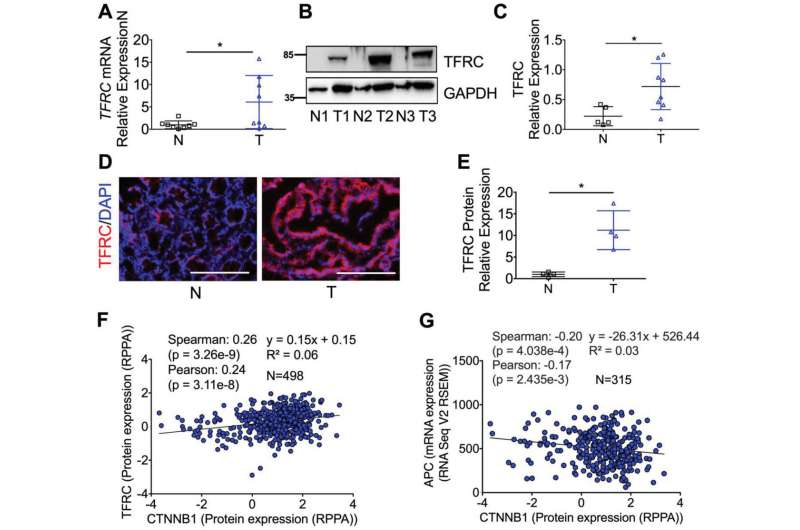This article has been reviewed according to Science X's editorial process and policies. Editors have highlighted the following attributes while ensuring the content's credibility:
fact-checked
peer-reviewed publication
trusted source
proofread
Scientists describe how iron helps drive tumor development in colorectal cancer

Excessive iron absorption by tumor cells in the digestive tract is known to play a major role in driving colorectal cancer—the third most prevalent and third leading cause of cancer deaths in the U.S.
In a new study published in the journal Advanced Science, University of New Mexico researchers describe the part played by the transferrin receptor (TFRC) gene in the growth of colorectal cancer tumors.
Iron is absorbed into intestinal cells both from the bloodstream and from iron-rich foods, such as red meat, said Xiang Xue, Ph.D., assistant professor in the UNM Department of Biochemistry & Molecular Biology.
The TFRC pathway normally regulates how much iron is delivered from the blood to the intestine, but in cancer it goes awry. "TFRC is highly increased in tumor tissue compared to normal tissue," he said. "That means it can help the cells to get more iron to proliferate."
Xue's lab found that when TFRC is inactivated, it extends the survival of animals that would otherwise develop cancer tumors. But the search for potential cancer treatments must walk a fine line between inhibiting excessive iron absorption to prevent tumor growth while not depriving the body of the normal amounts of iron it needs to function.
"If you limit TRFC you can limit the iron," Xue said. "It's potentially a therapeutic target, but it has its own intrinsic problems, because iron is needed for normal cell survival."
Cancer cells that are deprived of iron suffer DNA damage and self-destruct, he said.
Going forward, Xue's lab will study chelators—molecules that bind strongly with iron—to see whether these can be used to draw iron out of cancer cells in hopes of shrinking tumors.
"This paper just takes advantage of what we can easily do at the moment," he said. "It validates our previous concepts. If you can reduce iron in the colon cancer cell it can potentially be therapeutic."
Meanwhile Xue urges people to eat red meat in moderation, noting that some pursue fad diets in which they consume excessive quantities of meat, putting themselves at higher risk of developing colorectal cancer.
"I'm not going to say you're not going to eat red meat," he said. "There are still some nutrients you need to get from meat. I would just say don't eat too much."
More information: Hyeoncheol Kim et al, Transferrin Receptor‐Mediated Iron Uptake Promotes Colon Tumorigenesis, Advanced Science (2023). DOI: 10.1002/advs.202207693


















